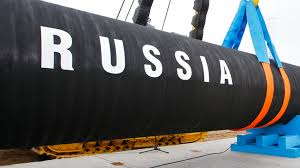This week, European Union leaders must take decisive action to prevent escalating energy costs and a lack of supplies from further destabilizing their already fragile economy and igniting unrest. The 27 members must remain unified in their opposition to Russian President Vladimir Putin at the same time.
The EU’s executive Commission is presenting a plan on Tuesday in preparation for the start of a crucial summit on Thursday. The plan must bridge the enormous divide between those who favor imposing a common gas price cap to keep prices down and those who believe it would primarily keep out supplies, further starving industries and businesses.
Then, over the course of two days of negotiations that may be difficult, EU leaders will try to reach a consensus before the weekend.
Alexander De Croo, the prime minister of Belgium, stated that “Europe is facing its week of truth.” It’s hit or miss this week,”
The 27-member bloc’s reliance on Russian energy was quickly recognized by EU member states as a grave political blunder. They discovered it almost immediately after Putin invaded neighboring Ukraine on February 24. The rich bloc of 450 million people has been working hard to find solutions to prevent cold temperatures from entering the homes of the most vulnerable people and companies from shutting down due to a lack of accessible electricity ever since sanctions were placed on Russia’s energy sector.
The capacity to come up with a shared exit strategy from the crisis could have a direct impact on the future of the EU, as nationalists and right-wing populists have become more vocal about the bloc’s collective approach.
According to Pawel Zerka of the European Council on Foreign Relations, “the impending winter might freeze and fracture European sentiment” – the citizens’ emotional attachment to the concept of Europe as well as their common sense of belonging and trust among European nations.
Even De Croo, the president of one of the countries that are most supportive of the EU, is aware that there is no more time to dither. The EU must now start delivering if it still wants to be taken seriously, keep energy prices in check, and better safeguard households and companies in this energy conflict, he said.
De Croo has been exerting significant pressure on the EU Commission in recent weeks to set a price restriction on all gas imports into the EU, and other nations like Poland and Greece have also stepped up their pressure.
The executive branch of the bloc was scheduled to present a strategy to address the shortages on Tuesday. It is a difficult assignment given the fundamental disagreements between Germany, a market leader, and others who believe a gas price ceiling will not result in a drop in supply. Germany opposes a full gas price cap.
The Commission is anticipated to propose a solution that would enable an emergency temporary corrective mechanism to take effect.
If additional nudging was required, the International Energy Agency provided it early this month when it said that “Russia is intensifying its use of natural gas supplies as a political weapon, posing an unprecedented risk to Europe’s security of gas supply.”
Even while the hoarding of gas supplies has intensified and the dependency on Russian supply has decreased to less than 10%, dangers still exist.
Before the 2022–2023 heating season, when the European gas grid is most vulnerable, “the potential of a complete cut-off of Russian gas deliveries cannot be excluded,” the IEA stated.
Additionally, the energy crisis is tearing at the foundation of European society. According to the European Trade Union Confederation (ETUC), this year’s inflation-adjusted pay declines have been as much as 9% across all EU member states. In the meantime, it claimed that business earnings in Romania were rising, sometimes by as much as 6.5 percent.
Manon Aubry, an EU politician from the Left group, stated that “people are skipping meals, having to give up leisure time, and families are forced to choose between filling up their cars and putting on the heating.”
With such possible societal unrest in the background, EU leaders are expected to decide on a method to pool gas purchases in order to ensure that member states stop competing with one another to increase reserves and raise overall energy prices.
EU nations have individually started supporting vulnerable sectors to combat the threat of corporate failures and industrial decline, even if doing so runs the risk of distorting the market. The idea of the EU’s common market is in danger if a wealthy member state can pour billions of euros into a sector while a less fortunate one must eke out an existence while enviously watching.
Due to this, many people have criticized Germany’s 200 billion euro plan to support its industry in order to survive through the upcoming two winters. But on the other hand, everyone might win by keeping Germany’s industrial machinery turning. Generally speaking, De Croo added, “what is good for Germany is good for us.”

















